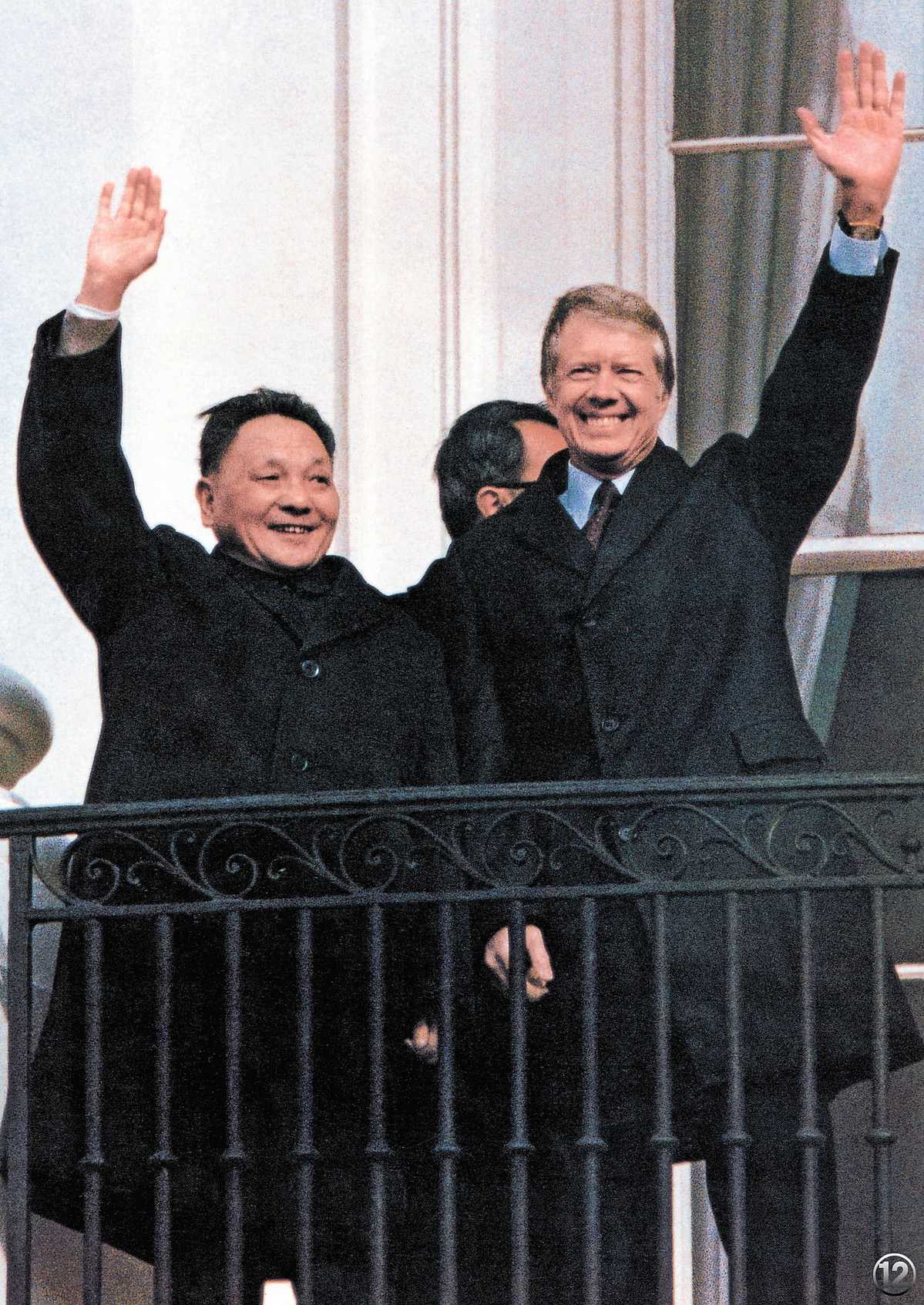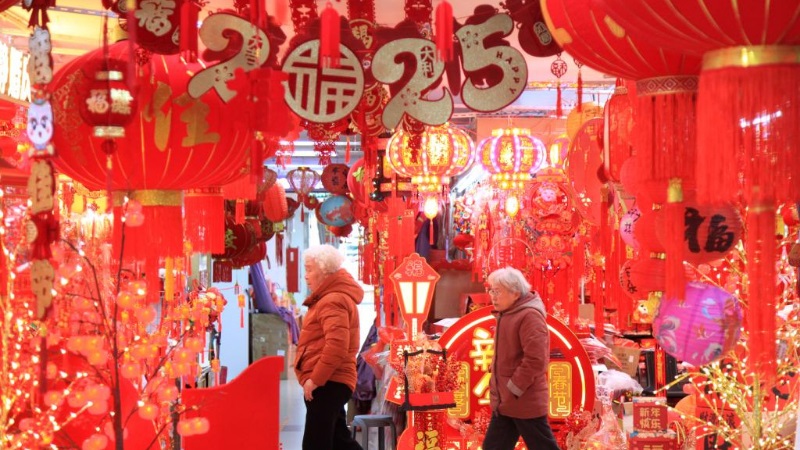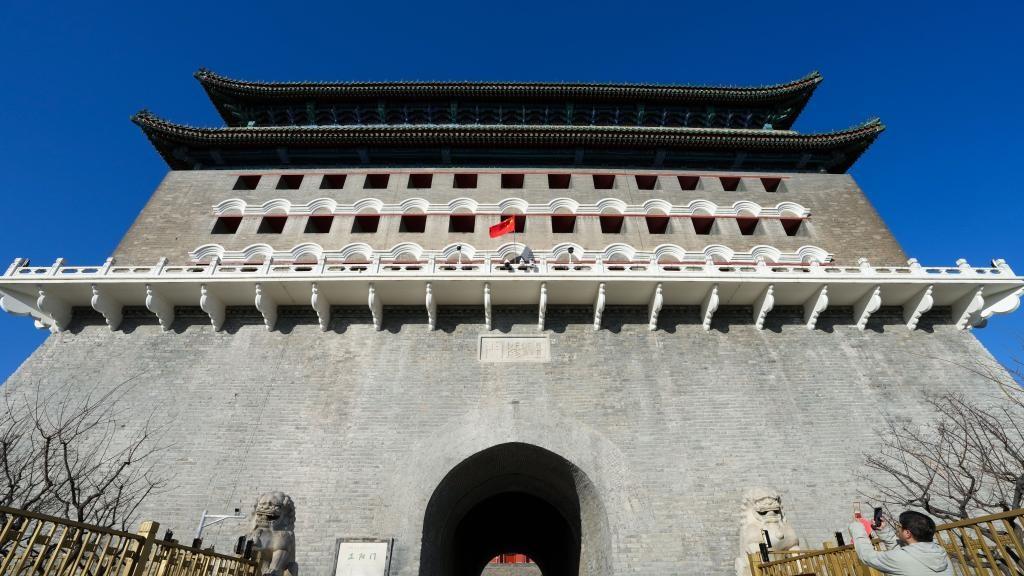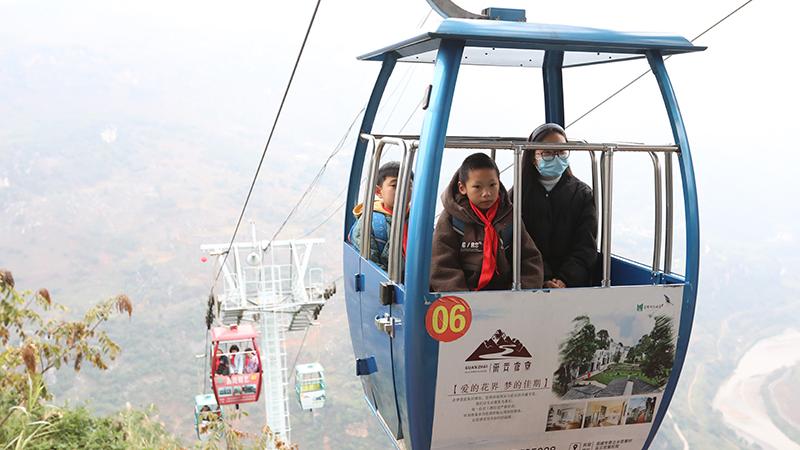Jimmy Carter's presidency, life remembered

Chinese leader Deng Xiaoping stands beside US president Jimmy Carter at the White House in Washington, DC, in January 1979. (Photo/China News Service)
Jimmy Carter, former United States president and Nobel Peace laureate who regarded normalizing US relations with China as one of his greatest feats, died at his home in Plains, Georgia, on Sunday. He was 100.
The longest-lived US president is survived by his children Jack, Chip, Jeff, and Amy, 11 grandchildren and 14 great-grandchildren. He was preceded in death by his wife Rosalynn and one grandchild.
"My father was a hero, not only to me but to everyone who believes in peace, human rights, and unselfish love," said Chip Carter.
In a statement on Sunday, US President Joe Biden called on people in search of the purpose and meaning of life to "study Jimmy Carter, a man of principle, faith, and humility".
Late on Sunday, the Chinese Ambassador to the US Xie Feng sent condolences to the family of the former president.
"President Carter saw establishing diplomatic relations with China as one of the most correct decisions he had ever made in his life. His historic contribution to the normalization and development of China-US relations will always be remembered by the Chinese people," Xie wrote on X on Sunday. "May he rest in peace, and may his legacy live on."
The native of the farming town of Plains became the 39th US president in 1977. He went on to steer an administration that secured the Panama Canal treaties for the major waterway, the Camp David Accords covering peace-oriented agreements between Israel and Egypt, the SALT II arms limit treaty with the Soviet Union, and the establishment of US diplomatic relations with the People's Republic of China.
To some of his contemporaries, the passing of the champion of US-China relations has tinged the "Carter era" with a nostalgic hue, given the setbacks in recent years in the "world's most consequential bilateral relations", which Carter had worked to improve in and out of office.
In February 2023, Carter opted to spend his final days at his Georgia home and received hospice care.
Messages of support have since poured into The Carter Center from throughout the US and beyond, wishing peace and comfort to a man who they believed had a tremendous impact on their lives.
Carter was a submarine officer when he first visited China in April 1949, and he said he had been fascinated with the country ever since.
"One of the most compelling facets of my life has been my relationship with China," he wrote in his book A Full Life: Reflections at Ninety. "My interest in the region was rekindled with my early visit as a submariner, and I continued to follow Chinese history."
It turns out that Carter became a household name in China, known for his historic vision and audacity in normalizing diplomatic relations between the two countries during his presidency on Jan 1, 1979, and the post-presidency charity projects in China through The Carter Center.
In his White House diaries and other books, Carter chronicled the most exciting and yet secret negotiations that led to the normalization of relations with China.

Jimmy Carter (second from left) and his wife Rosalynn (left) attend a photo exhibition marking the 30th anniversary of the establishment of China-US diplomatic relations in Beijing in January 2009. (Wang Jing/China Daily)
'Serious talks'
On May 17, 1977, instead of choosing a professional diplomat to represent him in Beijing, Carter announced that he had decided to send Leonard Woodcock, president of the United Auto Workers union, who was a "superb negotiator".
"This is what I wanted, since I was ready to begin serious talks with China," Carter wrote. "To preserve absolute secrecy, all messages concerning the talks with China would be sent directly from the White House."
Nearly two months later, Woodcock talked about the potential for normalizing relations with China.
"I told him I thought normal relations were advisable, I believed I could sell it to the American people, and I would be willing to take on the political responsibility of doing so," Carter wrote on July 7.
On Dec 15 (Dec 16, Beijing time), 1978, China and the United States issued the Joint Communique on the Establishment of Diplomatic Relations between the People's Republic of China and the United States of America.
"Normalizing relations with China required that we travel a long, difficult path to a politically unpopular but correct decision," he wrote in a journal dated Dec 15.
The excitement of the historic event glowed decades after he left office.
"I was very excited because this would be a turning point in the history of my country, and I think a turning point in the history of China, and maybe a turning point in the history of the entire world," Carter said in a 2014 documentary.
"We had been estranged from the Chinese people for more than 30 years, ever since the People's Republic was founded on my birthday as a matter of fact on Oct 1, 1949," he said.
Carter's insights on relations between Washington and Beijing have proven visionary, as proposals to address some of the problems he identified decades ago ring true today.
At a White House reception on Jan 29, 1979, to welcome the arrival of then-Chinese vice-premier Deng Xiaoping, Carter said, "Let us pledge together that both the United States and China will exhibit the understanding, patience, and persistence which will be needed in order for our new relationship to survive."
He added that the history and political and economic systems of the two countries are "vastly different", yet they should not hinder the progress of their relations.
"Let us recognize those differences, not as a source of divisiveness but of mutual benefit, as long as we have no illusions about our differences, our diversity can contribute to the vitality of our new relationship," he said in the speech.
While Carter was known for his monumental contributions to US-China relations, he put his feat in perspective.
"In December 1978, when vice-premier Deng Xiaoping and I announced our decision, we knew that we were opening an era of opportunity for both nations. I have been proud to witness the benefits that have followed," he said in a talk with the George H W Bush Foundation for US-China Relations in August 2021.
"Most important in my opinion has been four decades of peace in East Asia and the Pacific. During the previous four decades, both the US and China suffered from numerous violent conflicts in the region. Since then, our nations and the entire region have benefited from this peace," he said.
Carter was clearly aware of the fact that the China-US relationship is in a much different place than it was just a few years ago, but he remained optimistic.
In January 2019, The Carter Center held a three-day meeting to commemorate the 40th anniversary of the normalization of US-China relations.
"Our being the only US-based organization to do this is a stark indication of how the bilateral landscape has changed in recent years," Carter said.
Still, he noted, "The relationship has been of significant importance to me and to president George H W Bush, and I am hopeful that it will improve under the Biden administration."
Drawing from his engagement with China, Carter was a firm believer that both countries have the vision to choose peace over conflict, and for the whole world as well.
"Over the past four decades, there have been multiple situations that could have led to conflict, but the leaders of both countries made peace their priority. Through diplomacy, any crisis has been diverted," he said.
Global challenges, including climate change, nuclear proliferation, international terrorism, and various regional conflicts could best be resolved by leadership and participation from Washington and Beijing, he added.
Carter would also derive lessons from his White House years to shed light on addressing difficulties his country had with China.
He recalled, for example, that while he was in office the most serious economic competition for the US was with Japan, whose "improper trade practices" were believed to be endangering their diplomatic relationship.
To reverse the situation, Carter and the Japanese prime minister agreed to establish a panel of "wise men" who were familiar with both countries to advise them.
"I believe it would be a good idea for a similar small group of knowledgeable leaders to be formed to address some of the disputes that now threaten the friendly relations between China and the United States created when Deng Xiaoping and I established diplomatic relations in 1979," Carter noted.
Chas W Freeman, US assistant secretary of defense for international security affairs from 1993 to 1994, served as interpreter when president Richard Nixon visited China in 1972. He first met Carter in 1975 at a friend's house at Harvard Law School.
He briefed Carter, who was campaigning for the presidency, about security issues in Asia before he went to Tokyo to attend a trilateral commission meeting in May of that year.
"I found him remarkably quick to master the details of what I was saying to him," Freeman told China Daily.
He said he also had the honor of introducing Carter to Deng Xiaoping when he visited Beijing in 1981.
Freeman said Carter always retained the "pride in his achievement in normalizing US relations with China … he understood the nature of Chinese concerns".
Freeman said Carter distinguished himself after his presidency, as he was always a man very strong in his faith and religion. He had a sense of duty to people and he worked with the nonprofit group Habitat for Humanity, building houses for poor people with his own hands, and he was an intelligent commentator on world affairs, Freeman said.
"So he's an honest man, a decent man, a caring man, a humble man. And that made him very unusual in this period," Freeman said. "And we don't have many of those anymore. So he will be missed."
Freeman said that Carter was "really quite remarkable" in the realm of foreign policy, but he disagreed with his "excessive emphasis" on ideology in foreign policy.
"There had always been an element of ideology in American foreign policy, going back to Woodrow Wilson, for example, but Carter took it to a new level, and so I think values do have a role in foreign policy, but not as much as he thought," Freeman said.
J. Stapleton Roy, who was deputy to Leonard Woodcock, chief of the US Liaison Office in Beijing in 1978, said he was involved in drawing up the recommendations to Carter as to how Washington should handle normalization negotiations and gave him three options.
One option was to go for full normalization of diplomatic relations, followed by two lesser choices, which stopped short of full normalization but would be less politically risky in the US.
"We gave them, and he said, he cited the most difficult one, which was to go for full normalization," Roy said. "It required the United States to do things that most presidents would not have had the political courage to do."
"I have enormous respect for him, because of his political courage, and his willingness to take those steps," Roy said.
Roy became deputy chief of mission when the US established diplomatic relations with the People's Republic of China in 1979, and Woodcock became the first ambassador.
Roy himself assumed the ambassadorial post in Beijing from 1991 to 1995.
'Severely underestimated'
For Roy, Carter was a president "severely underestimated" and he needs to be reevaluated.
"I was in the United States when he became president, and I saw how his initial popularity decreased, and he was badly damaged by the Iran hostage situation," Roy said. "But the reality is that in his first two years really, he concluded more important international agreements than most presidents do in eight years."
Roy also gave credit to Carter for appointing Paul Volcker as chairman of the Federal Reserve, who finally did what many economists said was impossible — curbing the raging inflation in the US that had reached 15 percent.
"Most people would say he was a failed president, and I would disagree with that position. I think he was a very effective president in certain ways but that he was not able to retain strong public support," Roy said.
When Carter retired, he devoted his entire time to doing good deeds through The Carter Center.
For Sharon Woodcock, wife of Leonard Woodcock, her memory of Carter always begins with his smile and warm words.
"He was pleased for Leonard when learning of our marriage plans. He took the time to write me a personal note of congratulations and best wishes for many years to come. Many months later, I met him in person and was greeted with a hug and broad smile," Woodcock told China Daily.
Carter's legacy also could be how he personally used the power and platform of his position in office and afterward, according to Woodcock.
"I think it should be said that he used that position 'to assist and mend' rather than 'abuse and corrupt'," she said.
That includes his caring about making lives better for others — making prostheses for landmine victims, eradicating tropical diseases, and assisting with housing for the needy.
Carter and his wife, Rosalynn, started The Carter Center in 1982 as "a place to help people who want to resolve disputes". It is also an institution devoted to public health initiatives.
One of the programs is to eradicate Guinea worm disease. He once told Kai Bird, the author of The Outlier: The Unfinished Presidency of Jimmy Carter, that he hoped to outlive the last Guinea worm.
"Last year there were only 13 cases of Guinea worm disease in humans. He may have succeeded," Bird wrote in an article in 2023.
When Carter's team led the international effort to end Guinea worm disease in 1986, about 3.5 million human cases occurred annually in 21 countries in Africa and Asia, according to The Carter Center.
In Beijing, The Carter Center planned and helped design a large prosthesis factory. It also carried out a five-year project to provide special education teaching skills at schools in China, training hundreds of instructors for teachers to address the needs of many Chinese suffering from disabilities.
Carter last visited China in September 2014, when he spent 10 days traveling to Beijing, Xi'an, Qingdao, and Shanghai, to meet business and political leaders and university students.
"The year 2014 was the 35th anniversary of normalized relations between our countries, 110 years after Deng was born, and 65 years after my first visit to China and the foundation of the People's Republic of China," was how he recalled the trip in an almost poignant way.
Photos
Related Stories
- Chinese defense ministry slams U.S. annual defense policy bill
- China, U.S. should expand list and make bigger pie of cooperation
- China mourns passing of former U.S. President Jimmy Carter: foreign ministry
- US harvests gains of war economics, dollar hegemony
- Xi hails Carter's contribution to promoting ties
Copyright © 2024 People's Daily Online. All Rights Reserved.









